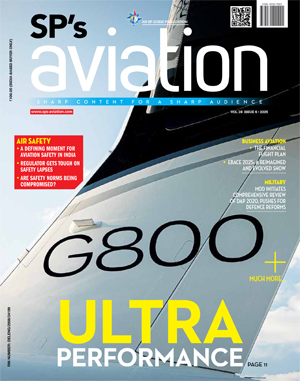INDIAN ARMED FORCES CHIEFS ON OUR RELENTLESS AND FOCUSED PUBLISHING EFFORTS

The insightful articles, inspiring narrations and analytical perspectives presented by the Editorial Team, establish an alluring connect with the reader. My compliments and best wishes to SP Guide Publications.

"Over the past 60 years, the growth of SP Guide Publications has mirrored the rising stature of Indian Navy. Its well-researched and informative magazines on Defence and Aerospace sector have served to shape an educated opinion of our military personnel, policy makers and the public alike. I wish SP's Publication team continued success, fair winds and following seas in all future endeavour!"

Since, its inception in 1964, SP Guide Publications has consistently demonstrated commitment to high-quality journalism in the aerospace and defence sectors, earning a well-deserved reputation as Asia's largest media house in this domain. I wish SP Guide Publications continued success in its pursuit of excellence.
- Prime Minister Modi Visits Punjab’s Adampur Air Base, Interacts with Airmen after Successful ‘Operation Sindoor’; Stern Message to Pakistan
- The layered Air Defence systems that worked superbly, the key element of Operation Sindoor
- Operation Sindoor | Day 2 DGMOs Briefing
- Operation Sindoor: Resolute yet Restrained
- India's Operation Sindoor Sends a Clear Message to Terror and the World – ‘ZERO TOLERANCE’
- Japan and India set forth a defence cooperation consultancy framework, talks on tank and jet engines
The Year Gone By Not in Vain!
The government has the capability to deliver; but will need time.
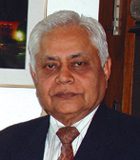 |
By Air Marshal B.K. Pandey (Retd) Former Air Officer Commanding-in-Chief of Training Command, IAF |
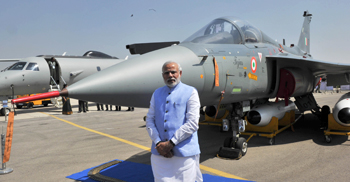
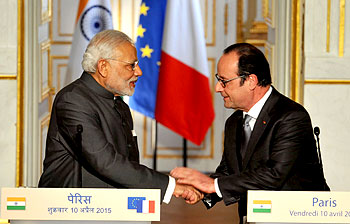
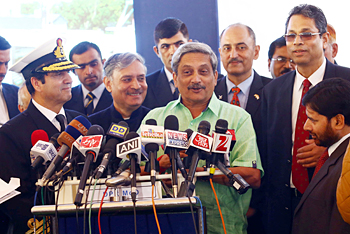
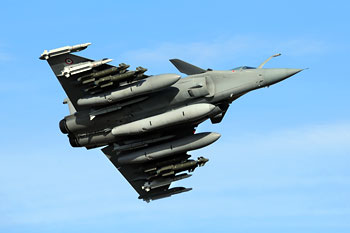
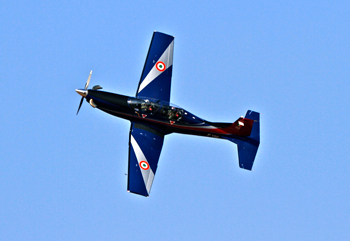
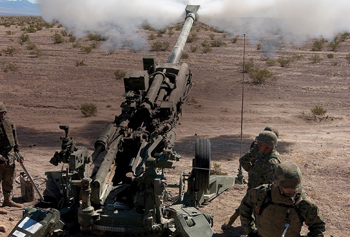
As the Modi-led government completed one year in office on May 26, the ongoing celebrations by the BJP at the national level are being marred by a raging debate on its performance that is being evaluated against the commitments made in its election manifesto.
While the onslaught on the BJP-led government by all the opposition parties combined should have been expected, it is important to understand that in a large nation like India with a diverse political system under a federal structure of governance, collective decision making and problems of mind boggling complexity that have remained unresolved for decades, 365 days is much too short a period to expect any dramatic turnaround across the board by any government. In any case, producing tangible results that are visible on the ground, is far more difficult and challenging than delivering speeches to win votes. However, what could justifiably be expected is that in the first year of office, the new government enunciate progressive policies for inclusive growth, set the template for the balanced development of all segments of the economy and above all ensure a convincing display of positive intent.365 days is much too short a period to expect any dramatic turnaround across the board by any government.
The budgetary allocation for defence did not cater for the inductions of a large number of weapon systems and platforms urgently required.
The initial indications of the approach of the NDA government towards the Indian armed forces and as to where they figure in its list of priorities was somewhat disappointing. It began with the appointment of Arun Jaitley, the Minister of Finance as a part time Minister of Defence. This was particularly incongruous as Defence figured high on the list of priorities in BJP’s election manifesto. A permanent Minister of Defence was appointed only six months later. The lack of focus of the government of the day on Defence was once again revealed in the allocation for Defence in the budget for Financial Year 2015-16 presented by Finance Minister Arun Jaitley who held charge as Defence Minister. The allocation for Defence was enhanced by a measly 11 per cent, a figure that was not adequate even to cater for inflation! This was particularly uninspiring for the armed forces as the budgetary allocation for defence did not cater for the inductions of a large number of weapon systems and platforms urgently required for capability building by all the three wings of the armed forces as an integral part of their respective modernisation plans that had been pending for years.
Perhaps the most important exercise that the Minister of Defence has undertaken is the revamp of the Defence Procurement Procedure.
But credit must be given where it is due. Displaying the rare ability of out-of-the-box thinking to take on a problem head on when it came to a problem of national security, Prime Minister Modi found a way to break the logjam in the tender for 126 medium multi-role combat aircraft that had been languishing for eight years and there appeared to be no solution in sight. Both the parties in the deal were not prepared to climb down from their respective positions that had led to a stalemate. Bypassing the stalled tender, the Prime Minister succeeded in arranging a Government-to-Government transaction for 36 Rafale fighter jets to start with. The Indian Air Force (IAF) needs to induct modern combat aircraft urgently to restore the strength of the combat fleet to the authorised level and regain a respectable level of operational capability.
The government has the capability to deliver; but will need time.
Earlier on, two months after the BJP government came into power, the pre-poll promise of speedy decisions on procurement of weapon systems was put into action with the then Defence Minister Arun Jaitley in his very first meeting of the Defence Acquisition Council (DAC) cleared procurements worth over Rs 34,000 crore. Similarly, in May this year, the DAC headed by Minister of Defence Manohar Parrikar cleared a number of proposals including the single-vendor offer by Airbus-Tata consortium to replace the IAF’s ageing fleet of 56 Avro aircraft and accepted Russia’s offer to build 200 light-utility helicopters under the Make in India initiative.
The DAC also cleared acquisition of 145 M777 ultra-light Howitzers from the US under a Government-to-Government deal as during the UPA rule, the tender floated globally for this weapon system had been cancelled five times. But perhaps the most important exercise that the Minister of Defence has undertaken is the revamp of the Defence Procurement Procedure that had acquired a semblance notoriety as under this procedure over the last decade only one deal i.e. for the Pilatus PC-7 Mk II basic turboprop trainer had gone through successfully.
The government has the capability to deliver; but will need time. The nation needs to exercise patience. But what has disappointed the ex-armed forces community is the inordinate delay in the implementation of the revised pension scheme which was a part of the pre-poll commitment by the Prime Minister himself.





